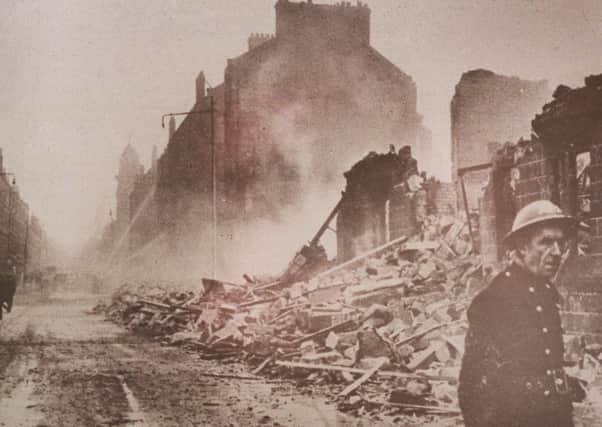Scotsman 200: Terror and destruction of the Clydebank Blitz


Saturday 15 March 1941
All-night raid on Clydeside
Scotland experienced its longest and most severe air raid of the war on Thursday night. The main attack was delivered on Clydeside, where casualties and damage resulted, but some high explosives and incendiaries were also dropped in scattered areas elsewhere in Scotland. Several districts in England were also attacked, Merseyside experiencing a heavy raid.
Thirteen German bombers were brought down during the night, eleven of them by RAF fighters.
Advertisement
Hide AdEnemy planes returned to the West and Central districts of Scotland last night. As the evening advanced the gunfire became more and more intense. Exploding shells made brilliant splashes of colour, and sometimes, for seconds at a time, the area was clearly lit as at mid-day. Once again the aeroplanes were flying at a terrific height and were invisible from the ground.
Several tenement houses, schools, churches and other buildings suffered on Thursday in Clydeside’s first all-night air raid, which left a trail of casualties, many of them fatal.
Caught out of doors when the raid started, many people sought safety in the nearest shelter, and like the thousands who were patronising the cinema and theatre, had to remain there for hours.
Waves of bombers loaded with high explosives and incendiaries swept over the area, which was bathed in moonlight, and were immediately met by a terrific anti-aircraft barrage. The flash of tracer bullets indicated that our fighters were also in action. Many flares were dropped by the enemy machines, some of the chandelier type. A number of these were shot out before they reached the ground.
Following one heavy burst of gunfire, a bomber flew low with its engine running irregularly, and unconfirmed reports state that this machine and another ultimately crashed. Some of the crew managed to bale out before the bomber burst into flames.
The civil defence services emerged triumphant from their testing ordeal. Acts of heroism in the face of indiscriminate bombing have won them the admiration of the population. Two policemen and two auxiliary firemen lost their lives in carrying out their duties.
Advertisement
Hide AdClydeside went calmly about its ordinary duties after the all-night attack. From all the working class districts throughout the area, some of which suffered considerable damage, the workers left home at their usual hour grimly determined to carry on their jobs without interruption.
The women folk were as quietly heroic. Despite the harassing experiences of the night, they pluckily went to it to put their homes right and clear away any accumulation of debris.
Advertisement
Hide AdTwo families were wiped out by a direct hit on two houses in a scheme in the Glasgow area. Three men and a woman were killed at on town in the district which suffered severely. They were in a building damaged or struck by a high explosive. This town bore the brunt of the attack.
Incendiary bombs were showered down and a church was struck. The minister had an alarming experience when a heavy bomb fell near his house, but fortunately without causing any great damage.
A tenement occupied by many families in another working class area was demolished by a bomb. Men, women and children were trapped. The lot of the rescue workers, as well as that of those trapped in debris, was rendered worse by further bombing during rescue operations.
Paying tribute to the high courage of the victims, an Air Raid Precautions warden said he saw one little girl about three years old in the wreckage. When he tried to get to her, all she said was: “Let me sleep, let me sleep.” The child was brought out soon afterwards, and seemed little the worse for her ordeal.
One ARP worker who took a leading part in the rescue operations lost his wife and two children when the tenement collapsed. In spite of this, he continued the task of extricating neighbours trapped in the debris. Among those rescued were two babies a few months old. One of them had been partially buried for more than an hour. One tenant, trapped to the neck in rubble, joined the rescue squad immediately after he had been released.
A number of the casualties were caused when the victims were walking in the street. One man was found dead in a telephone box.
Advertisement
Hide AdA number of people lost their lives when a bomb struck a working class tenement near an industrial establishment. The latter premises escaped with a few broken windows. Tenants who took cover in back court brick shelters were unhurt, though some of them found their way out blocked by a high pile of debris.
The ingenuity of cinema and theatre managements was equal to the occasion. When it was realised that patrons must spend the best part of the night under their care, impromptu concerts were staged after the normal programme had been given, and in some “houses” the audience was entertained to tea, biscuits and cake. A cheerful atmosphere was maintained, but as the morning wore on many patrons were seen sleeping soundly in their seats.
The full text of this edited extract can be found at The Scotsman Digital Archive